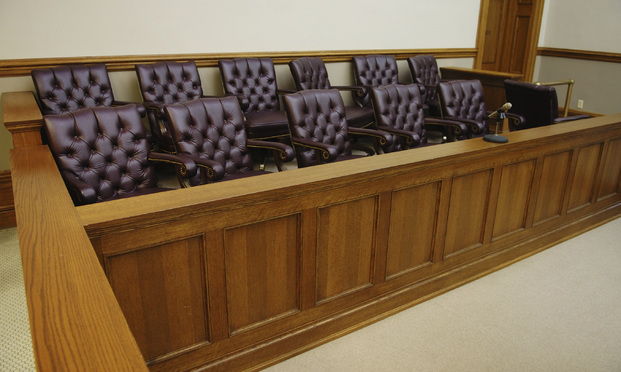TAKE NOTE: Texas No Longer Needs Your Consent for an Experimental Jury Trial, Thanks to Emergency Order
Texas trial lawyers have mixed feelings about a new Texas Supreme Court COVID-19 emergency order that deletes a requirement that lawyers and litigants have to consent before their cases move to an experimental jury trial.
June 30, 2020 at 01:52 PM
5 minute read

The Texas courts that experiment with jury trials this summer will no longer depend upon the consent of attorneys and litigants to move to trial under a Texas Supreme Court emergency order issued Monday.
And litigators have mixed feelings about the court taking away their ability to consent to a jury trial experiment. For some, being forced into a jury trial experiment—perhaps a remote trial, in-person with precautions, or some hybrid of both—might push them to opt for a bench trial instead.
The high court had banned most jury trials through Aug. 1, except for some limited, controlled experiments, which would have gone forward only with consent from the parties. But the court's 18th emergency order removed the requirement to get the litigants' consent. It also extended the jury trial ban—except the experiments—through Sept. 1.
"If I were faced with the choice of having to participate in a mandatory experimental jury trial with a non-diverse online jury pool, I might well advise my client to agree to try the case to the judge instead, if I thought that the judge was fair and impartial," said Dallas attorney Quentin Brogdon.
He noted that he understands the court system is "between a rock and a hard place" as COVID-19 cases spike in Texas.
Related: COVID Could Prompt Litigants to Choose Bench Trials Over Juries, Thanks to Six-Month Backlog of Civil Cases
 Quentin Brogdon
Quentin Brogdon"On the one hand, we need to get the courts reopened. On the other hand, we cannot and should not trample on the rights of the litigants at the courthouse," said Brogdon, partner in Crain Brogdon Rogers in Dallas. "It is one thing to require a nonbinding summary jury trial between litigants, but it is quite another thing to require a binding online trial without the consent of the litigants. We need to tread very carefully before we start mandating radical experimentation."
 Pat Mizell
Pat MizellHouston trial lawyer Pat Mizell, however, said he's fine with the change.
"Presumably the jury trial would be a small one- or two-day matter, and done by Zoom. The trial judge could still use discretion and reset the case if someone had an articulate objection," said Mizell, partner in Vinson & Elkins. "I think we are in this predicament until there is a vaccine, so we've got to figure out something to keep things moving."
 David Beck
David BeckBeck Redden partner David Beck of Houston comes down somewhere in the middle. If a lawyer was scheduled for an experimental jury trial without consent, but felt that it wasn't safe for the client, jurors or himself, the lawyer would do whatever was possible to get a continuance or reschedule the matter, he explained. Beck said he would trust judges to use their discretion and only proceed if it were safe.
"The fact that they are not requiring consent does not mean that the individual judges will proceed if there's strenuous objections by the parties and their counsel in the case," Beck explained. "The way I read the Supreme Court order, the fact that consent was deleted means consent is not required, but it still doesn't mean a trial judge does not have discretion about the cases. I think it gives the judges the latitude to experiment."
 Chief Justice Nathan Hecht
Chief Justice Nathan HechtTexas Supreme Court Chief Justice Nathan Hecht defended the court's decision to remove the consent requirement.
He wrote in an email that it would be unfair if one litigant wanted to have a jury trial, but opposing counsel withheld consent.
"Everyone knows it's the imminence of trial that helps resolve cases. This is standard procedure we're all used to. Earlier in the pandemic, there was concern that no one be compelled to come to the courthouse at risk to health. But [the Texas Office of Court Administration's] guidelines and review process for proposed trials have minimized that risk. There is less reason for the special consent requirement," Hecht said. "Lawyers and parties can always raise health concerns, and judges will weigh them like any other request for postponement."
Read the full emergency order:
Related stories:
Texas Jury Trials to Resume This Summer Under Experimental Program
Most Houston Lawyers Don't Want Jury Trials Back Before Fall, Survey Says
This content has been archived. It is available through our partners, LexisNexis® and Bloomberg Law.
To view this content, please continue to their sites.
Not a Lexis Subscriber?
Subscribe Now
Not a Bloomberg Law Subscriber?
Subscribe Now
NOT FOR REPRINT
© 2025 ALM Global, LLC, All Rights Reserved. Request academic re-use from www.copyright.com. All other uses, submit a request to [email protected]. For more information visit Asset & Logo Licensing.
You Might Like
View All

Sheppard Mullin Expands in Dallas With 6-Lawyer White Collar Team From Bradley
3 minute read
Once the LA Fires Are Extinguished, Expect the Litigation to Unfold for Years
5 minute read
Law Firms Mentioned
Trending Stories
- 1Snapshot Judgement: The Case Against Illustrated Indictments
- 2Texas Supreme Court Grapples Over Fifth Circuit Question on State Usury Law
- 3Exploring the Opportunities and Risks for Generative AI and Corporate Databases: An Introduction
- 4Farella Elevates First Female Firmwide Managing Partners
- 5Family Court 2024 Roundup: Part I
Who Got The Work
J. Brugh Lower of Gibbons has entered an appearance for industrial equipment supplier Devco Corporation in a pending trademark infringement lawsuit. The suit, accusing the defendant of selling knock-off Graco products, was filed Dec. 18 in New Jersey District Court by Rivkin Radler on behalf of Graco Inc. and Graco Minnesota. The case, assigned to U.S. District Judge Zahid N. Quraishi, is 3:24-cv-11294, Graco Inc. et al v. Devco Corporation.
Who Got The Work
Rebecca Maller-Stein and Kent A. Yalowitz of Arnold & Porter Kaye Scholer have entered their appearances for Hanaco Venture Capital and its executives, Lior Prosor and David Frankel, in a pending securities lawsuit. The action, filed on Dec. 24 in New York Southern District Court by Zell, Aron & Co. on behalf of Goldeneye Advisors, accuses the defendants of negligently and fraudulently managing the plaintiff's $1 million investment. The case, assigned to U.S. District Judge Vernon S. Broderick, is 1:24-cv-09918, Goldeneye Advisors, LLC v. Hanaco Venture Capital, Ltd. et al.
Who Got The Work
Attorneys from A&O Shearman has stepped in as defense counsel for Toronto-Dominion Bank and other defendants in a pending securities class action. The suit, filed Dec. 11 in New York Southern District Court by Bleichmar Fonti & Auld, accuses the defendants of concealing the bank's 'pervasive' deficiencies in regards to its compliance with the Bank Secrecy Act and the quality of its anti-money laundering controls. The case, assigned to U.S. District Judge Arun Subramanian, is 1:24-cv-09445, Gonzalez v. The Toronto-Dominion Bank et al.
Who Got The Work
Crown Castle International, a Pennsylvania company providing shared communications infrastructure, has turned to Luke D. Wolf of Gordon Rees Scully Mansukhani to fend off a pending breach-of-contract lawsuit. The court action, filed Nov. 25 in Michigan Eastern District Court by Hooper Hathaway PC on behalf of The Town Residences LLC, accuses Crown Castle of failing to transfer approximately $30,000 in utility payments from T-Mobile in breach of a roof-top lease and assignment agreement. The case, assigned to U.S. District Judge Susan K. Declercq, is 2:24-cv-13131, The Town Residences LLC v. T-Mobile US, Inc. et al.
Who Got The Work
Wilfred P. Coronato and Daniel M. Schwartz of McCarter & English have stepped in as defense counsel to Electrolux Home Products Inc. in a pending product liability lawsuit. The court action, filed Nov. 26 in New York Eastern District Court by Poulos Lopiccolo PC and Nagel Rice LLP on behalf of David Stern, alleges that the defendant's refrigerators’ drawers and shelving repeatedly break and fall apart within months after purchase. The case, assigned to U.S. District Judge Joan M. Azrack, is 2:24-cv-08204, Stern v. Electrolux Home Products, Inc.
Featured Firms
Law Offices of Gary Martin Hays & Associates, P.C.
(470) 294-1674
Law Offices of Mark E. Salomone
(857) 444-6468
Smith & Hassler
(713) 739-1250






